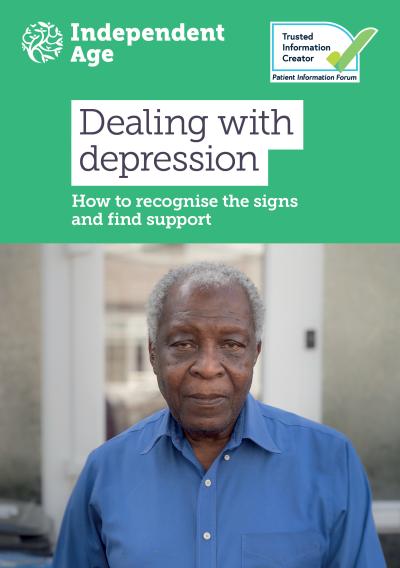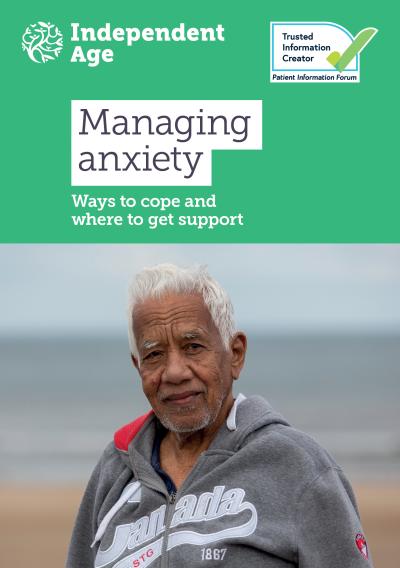Related publications

Dealing with depression

Everyone gets low moods from time to time, but if these feelings don’t go away, it could be a sign of depression. Knowing what to look out for and where you can go for help can be the first steps toward feeling better.
Depression is a common mental health problem that affects around 1 in 5 older people. It might include a low mood, feeling hopeless or losing enjoyment for things. But depression also has many other symptoms you might not expect.
It can be hard to tell if you have depression because how it feels and what it looks like can vary from person to person. You might experience a range of thoughts and feelings. For example, you might:
Older people with depression can experience more physical symptoms. This might mean you:
Visit the NHS website for more information about the symptoms of depression.
If you think a friend or relative might be depressed, our web page If you’re worried about someone’s mental health has more advice on how you can try to help.
It’s easy to blame yourself if you’re feeling low, but remember that depression is not your fault. Any difficult setback or life change can affect our mental health and make us more vulnerable to becoming depressed.
Your feelings of depression may be set off by bereavement or loss, feeling lonely or isolated, a period of ill health or by certain medications. Sometimes, you may find there’s no clear reason for feeling depressed.
Depression shares some symptoms with dementia, such as memory problems or difficulty concentrating. You may worry that you have dementia when you’re actually depressed. It may also make it harder to diagnose depression if you already have dementia.
If you’re worried about either condition, speak to your GP. You could also contact the Alzheimer’s Society or Alzheimer Scotland for more information on depression and dementia.
Often, periods of low mood won’t last long. If there’s an obvious cause, your mood may lift once the problem is resolved. But it’s okay to seek help at any time, whether you’ve just started feeling low or you’ve been finding things difficult for some time.
You might want to consider support if:
If you start to feel that life isn’t worth living or that you want to harm yourself, get help immediately.
| If your life is at risk, call 999 and ask for an ambulance. |
If you don’t want to call 999:
Mind has more information about how to get help in a crisis.
If you’re experiencing depression, it can feel hard to ask for help. You might be nervous about opening up to someone, but getting the right support can help you to start feeling better again.
Talking to friends, family or someone you trust about how you’re feeling is a good first step. You could also try a helpline for emotional or mental health advice and support, such as:
You don’t have to have physical symptoms to speak to your GP about your health. If you’re experiencing low mood or depression, your GP will be able to assess your situation and talk about treatment options with you. They might suggest:
It’s a good idea to write down everything you want to say to the GP so you don’t forget during the appointment. Our medical appointment planner can help you start. You might find it helpful to have a friend or relative with you for support when you see your GP.
Talking therapies usually involve speaking to a trained therapist about your thoughts, feelings and experiences. They can help you find ways to manage the difficulties you’re having. There are different types, including:
Your GP can refer you for NHS services, which may be offered one-to-one, in a group, over the phone or online. In England, you can also refer yourself.
You can read more about talking therapies and how to access them at:
You might consider private therapy if:
This might not be an option for everyone because it can be expensive. The cost can vary a lot, so it’s worth looking around.
Your GP should be able to help you find a therapist. You could also contact:
Make sure your therapist is accredited by a professional body, such as the BACP.
Your GP might offer you medication, such as antidepressants. They should tell you how long you may need to take it and about possible side effects. It’s important to check that any new medication will work well with anything you’re already taking.
Make sure you follow your GP’s advice for any medication you’ve been prescribed. If you want to take a lower dose or stop completely, talk to your GP first, even if you’re feeling better. Coming off some medications, such as antidepressants, can cause withdrawal symptoms if you stop taking them too quickly. Mind has more information about antidepressants.
Local organisations may offer counselling or have support groups, where people with shared experiences help each other. These include:
You could also ask your GP about local mental health organisations.
There are lots of things you can try to look after yourself, whether or not you’re getting help elsewhere. Different things work for different people, so try what feels comfortable for you.
For general ways to look after your mental health, see our web page Looking after your mental health.
Ask your GP or counsellor for recommendations of self-help resources that you can do in your own time. They might suggest books, audio guides or online services.
You can find free, practical tools on the NHS websites to help you with your mental health and wellbeing at:
You could also try to:
Feeling better can take time, so take things slowly. Try to be kind to yourself on both the good and bad days.

Consider booking an appointment with your GP.
Read our guide Dealing with depression.
Try the NHS mood self-assessment tool.
Read more about depression at Mind or Every Mind Matters.
By calling Independent Age's free and impartial Helpline, you can get information and advice from one of our friendly advisers, or order our free guides.